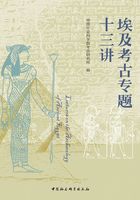
Introduction
China and Egypt are two ancient civilizations with long histories. In promoting cultural exchange and mutual learning between the two countries, the Chinese Academy of Social Sciences(CASS)launched the Archaeological Excavation and Research in Egypt as a key CASS Innovation project in July 2016. To better implement the program, the Institute of Archaeology, CASS, invited a number of renowned scholars in Egyptology and Egyptian archaeology from China and abroad, to present in the Archaeology of Ancient Egypt Speaker Series. This book is a product of the lecture series.
In the first lecture, Professor Jin Shoufu from Capital Normal University discussed the decoding of Egyptian hieroglyphs and the early history of Egyptology, as well as some major issues in Egyptology In the second lecture, Professor Jin gave an introduction to the history of the archaeology of ancient Egypt, and current archaeological studies. The third and fourth lectures, given by Professor Guo Dantong from Northeast Normal University, cover ancient Egyptian calendars, modern methods for constructing chronologies of ancient Egypt, as well as the Egyptian creation myth from a theological perspective. Professor Li Xiaodong from Northeast Normal University gave the fifth and sixth lectures that addressed the dating of the ivory tablet of Djer(the first Dynasty king)and the use of theories in Egyptology, and examined the meaning of the phrase“di ankh”and ancient Egyptian attitude toward sculptures and gods. The seventh lecture, presented by Dr. Matthew J. Adams, director of the W. F. Albright Institute of Archaeological Research(American School of Oriental Research in Jerusalem)was about the archaeological discovery of Ancient Mendes, an ancient city in the heart of the Nile delta and its significance in the reconstruction of the history from the 1st Dynasty to early Middle Kingdom. Professor Thomas Schneider from the University of British Columbia gave five lectures. First, he provided an overview of the formation and development of states and empires in ancient Egypt, covering natural environment, historical processes, kingship, social organization, economy, urbanism, the rise of military power, etc. Second, Professor Schneider discussed gods, temples, priests, rituals, religious reforms, as well as his own positions on the nature of understanding of the temples and rituals of ancient Egypt. Third, Prof. Schneider discussed ancient Egyptian conception of life and death, and the evolving history of the mortuary practice in both royal and non-royal contexts. Fourth, Professor Schneider focused on the society and identity in ancient Egypt by examining social hierarchies, attitude to foreigners, ages, and the roles of women. Last, Professor Schneider reviewed the archaeological discoveries in Saqqara, especially recent findings and the prospective. The last lecture was provided by Dr. Mahmoud Afifi, head of the Pharaonic Antiquities, Ministry of Antiquities. He discussed recent archaeological discoveries in Egypt and the archaeological investigations carried out by foreign missions. Finally, he welcomed the Institute of Archaeology CASS to conduct archaeological excavation and research in Egypt.
These lectures cover a wide range of topics in the archaeology of ancient Egypt and Egyptology, including overall reviews, discussions on specific subjects, recent archaeological findings, and new perspectives in Egyptology. Intellectually, the lecture series helps prepare the Institute of Archaeology(CASS)for the upcoming archaeological excavation in Egypt;it also serves Chinese scholars in Egyptology with new data and multiple perspectives. Furthermore, it helps the public fully understand ancient Egyptian civilization.